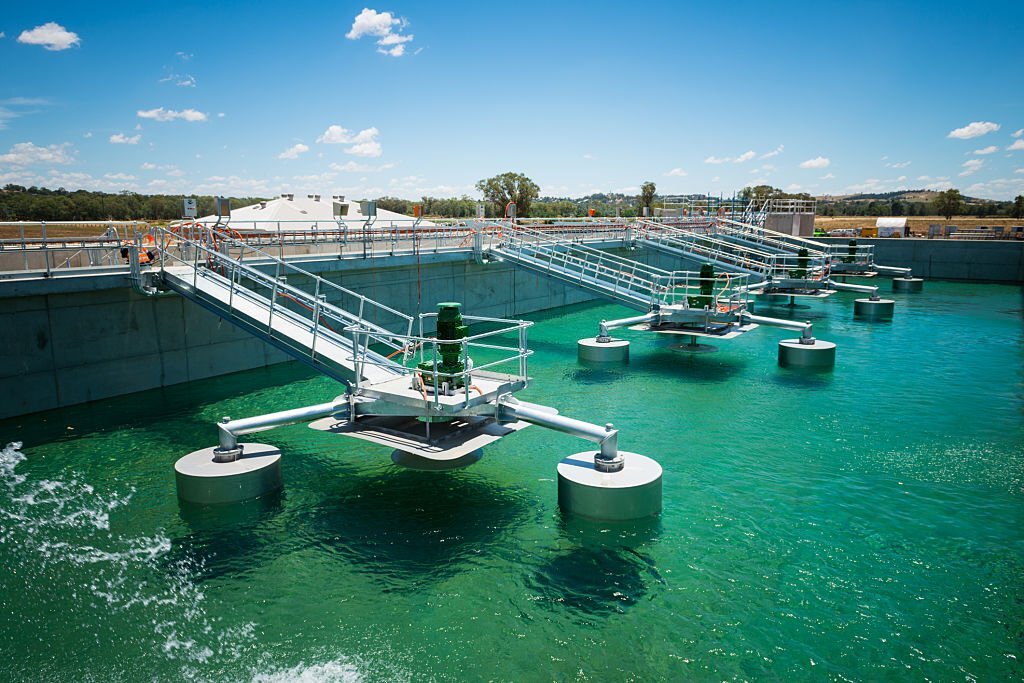Wastewater treatment plants protect public health and the environment by removing pollutants and contaminants from sewage, domestic, and industrial wastewater. However, these plants face several challenges, including high energy consumption, resource utilization, and operational costs. According to the International Energy Agency (IEA), wastewater treatment plants consume about 1% of global energy, equivalent to the energy consumption of Spain. Therefore, optimizing wastewater and sewage treatment plants is crucial to reducing energy consumption and minimizing environmental impact.
To achieve maximum efficiency, wastewater treatment plants must adopt advanced treatment technologies such as Membrane Bioreactor (MBR), Ultrafiltration (UF), and Reverse Osmosis (RO). Studies have shown that MBR technology can reduce energy consumption by up to 50% compared to traditional wastewater treatment methods. Effective monitoring and control systems are also essential for optimizing wastewater treatment plants. These systems use real-time data to promptly identify and address operational issues, improving treatment performance and reducing energy consumption.
Optimizing wastewater treatment plants can have significant benefits, including reducing energy consumption and minimizing environmental impact. By adopting advanced treatment technologies and implementing effective monitoring and control systems, wastewater treatment plants can continue to protect public health and the environment while operating efficiently.

How To Assess The Efficiency Of A Wastewater Treatment Plant?
Wastewater and sewage treatment plants are complex systems that require significant energy and resources to operate efficiently. It is essential to define and measure key performance indicators (KPIs) that can help identify areas for improvement to optimize their performance. Here, we discuss some of the most important KPIs for measuring wastewater treatment plant efficiency and describe methods for collecting and analyzing data to improve plant operations.
Defining Key Performance Indicators (KPIs)
Several KPIs are commonly used to measure the efficiency of wastewater treatment plants. These include:
Energy use per gallon treated
This measures the energy required to treat a single gallon of wastewater. Lower energy consumption indicates higher efficiency.
Chemical consumption
Chemicals are often used to aid in the treatment process, and tracking their usage can provide insights into how efficiently they are being used.
Sludge production
Sludge is a byproduct of the treatment process, and tracking its production can help identify inefficiencies.
Other KPIs that measure plant efficiency include
- hydraulic retention time (HRT)
- Nutrient removal efficiency
- Effluent quality.
These KPIs are often specific to the type of treatment plant and the regulatory requirements governing its operation.
Collecting Data on KPIs
Several methods for collecting data on KPIs range from manual monitoring to automated sensors and data analytics software. Manual monitoring involves physically measuring and recording data regularly. This can be time-consuming and prone to human error, but it is often the most accessible method for smaller plants.
Automated sensors are increasingly being used to monitor KPIs in real time. For example, flow meters can be used to track the volume of wastewater entering and leaving the treatment plant, while sensors can monitor chemical usage and sludge production. Data analytics software can then analyze this data and provide insights into plant operations.
Using Data to Improve Plant Operations
Once data has been collected on KPIs, it can be analyzed to identify areas for improvement. For example, if energy consumption per gallon treated is high, the plant may need to invest in energy-efficient equipment or explore alternative treatment methods that require less energy. Similarly, if sludge production is high, the plant may need to adjust its treatment processes to reduce waste.
Real-time data monitoring can also help identify operational issues, allowing plant operators to take corrective action before they become more significant problems. For example, if a sensor detects a sudden increase in chemical usage, operators can investigate the cause and take steps to address it before it becomes a more significant issue.
What Are The Strategies for Optimizing Wastewater Treatment Plants?
Wastewater or sewage treatment plants protect the environment and public health. Still, they face significant challenges in terms of energy consumption, resource utilization, and operational costs. Implementing advanced treatment technologies, optimizing treatment processes, improving energy efficiency, reducing resource consumption, and ensuring maintenance and upkeep are essential strategies for optimizing wastewater treatment plant efficiency.
Implementing Advanced Treatment Technologies
Various advanced treatment technologies are available that can improve the efficiency of wastewater treatment plants. For example, membrane filtration is a highly effective technique for removing suspended solids and pathogens from wastewater. Anaerobic digestion is another technology that can be used to break down organic matter in wastewater and produce biogas, which can be used to generate electricity or heat. UV disinfection is a chemical-free method for disinfecting wastewater and killing harmful bacteria and viruses.
The benefits and drawbacks of each technology must be carefully considered before implementing them. Factors such as the plant’s size, the influent’s quality, and the technology’s cost must be taken into account. The best approach is to conduct a feasibility study that evaluates each technology’s suitability for the plant’s specific needs.
Optimizing Treatment Processes
Treatment processes such as aeration, sedimentation, and filtration can be optimized for efficiency to reduce operational costs and improve treatment effectiveness. Process audits are useful for identifying areas that can be improved. This involves monitoring and analyzing key performance indicators (KPIs) such as energy use per gallon treated, chemical consumption, and sludge production.
Once the audit has been completed, the information obtained can be used to adjust plant operations and improve efficiency. For example, changing the amount of air provided during aeration to match the needs of the microorganisms can reduce energy consumption. Installing baffles in sedimentation tanks can improve the removal of suspended solids and reduce the amount of sludge produced.
Improving Energy Efficiency
Reducing energy consumption at wastewater and sewage treatment plants is essential for reducing operational costs and improving sustainability. Strategies for achieving this include optimizing pump and blower operations, using renewable energy sources, and enhancing energy recovery from wastewater.
Optimizing the operations of pumps and blowers is a simple yet effective strategy for reducing energy consumption. For example, using variable frequency drives (VFDs) to match the speed of pumps and blowers with the demand for treatment can significantly reduce energy consumption.
Using renewable energy sources such as solar and wind power is another strategy for reducing energy consumption. Many wastewater treatment plants have large areas of unused land that can be used to install solar panels or wind turbines.
Wastewater contains significant energy that can be recovered and used to generate electricity or heat. Technologies such as anaerobic digestion and microturbines can be used to recover this energy and improve energy efficiency.
Reducing Resource Consumption
Reducing chemical and water usage in plant operations can significantly reduce operational costs and improve sustainability. Strategies for achieving this include implementing water recycling systems, using alternative chemicals, and improving process control.
Water recycling systems can significantly reduce the freshwater required for plant operations. For example, using treated wastewater for flushing toilets, watering plants, or cooling equipment can reduce water usage by up to 50%.
Using alternative chemicals, such as enzymes and bio-based products, can reduce the chemicals required for plant operations. These alternatives are typically safer, more sustainable, and more effective than traditional chemicals.
Improving process control is another strategy for reducing resource consumption. Plant operators can optimize treatment efficiency and reduce resource consumption by implementing a process control system that monitors and adjusts treatment operations based on real-time data.
Ensuring Maintenance and Upkeep
Regular maintenance and upkeep of equipment are critical to maintaining plant efficiency. By implementing a preventive maintenance program, operators can identify and address equipment issues before they lead to breakdowns or other failures that can negatively impact plant performance. Additionally, regularly inspecting and cleaning equipment, such as pumps, blowers, and membranes, can help ensure they operate at peak efficiency. When equipment reaches the end of its useful life, replacing it with newer, more efficient equipment can also help improve plant efficiency.
Case Studies of Successful Wastewater Treatment Plant Optimization
Wastewater or sewage treatment plant optimization is critical to maintaining public health and environmental safety while minimizing operational costs. Numerous plants have successfully implemented strategies to optimize their efficiency, and some of these success stories are outlined below:
Redwood City Water Pollution Control Plant
This California-based plant implemented an energy management system that enabled it to optimize the energy consumption of its wastewater treatment processes. The plant used various energy-saving measures, such as high-efficiency motors, optimizing blower controls, and reducing air leakage. As a result, the plant reduced energy consumption by 10% and saved annually in energy costs.
East Bay Municipal Utility District (EBMUD) Wastewater Treatment Plant
The EBMUD plant in Oakland, California, implemented a comprehensive energy optimization program that included upgrading its aeration system, implementing energy-efficient equipment, and using renewable energy sources. These initiatives resulted in a 33% reduction in the plant’s energy consumption.
City of Bloomington Wastewater Treatment Plant
This plant in Indiana implemented a program to optimize its sludge dewatering process by using a more efficient polymer and improving the sludge dewatering equipment. These changes led to a 50% reduction in polymer usage, a 27% reduction in sludge volume.
City of Battle Creek Wastewater Treatment Plant
The Battle Creek plant in Michigan implemented a project to optimize its nutrient removal processes using a computer model to simulate plant operations and identify areas for improvement. The plant then used this information to optimize its chemical dosing, improve its aeration system, and reduce sludge production. These changes resulted in a 23% reduction in energy consumption, a 41% reduction in chemical usage, and savings annually in chemical costs.
These case studies demonstrate that optimizing wastewater treatment plant efficiency can result in significant cost savings while improving environmental and public health outcomes. Plants can achieve maximum efficiency and cost-effectiveness by implementing advanced treatment technologies, optimizing treatment processes, improving energy and resource efficiency, and ensuring regular maintenance and upkeep.
Where To Find The Best Wastewater Treatment Plant In India?
Ensure your environment remains clean and healthy by using Cleantech Water and its services today! Across numerous wastewater treatment companies in India, nothing beats our quality of services and products at Cleantech Water. We do not believe in degrading the quality of our sewage treatment plants to meet the deal price. All our plants undergo rigorous factory testing before getting approved by our professionals. Our artisans work diligently to offer premium-quality wastewater treatment plants to all our clients.
We ensure that our plants are highly durable, long-lasting, and resistant to damage, making Cleantech Water India the most trusted wastewater treatment plant. To learn more, contact us today at info@cleantechwater.co.in or call us at +91-9558996411.
Also Read: Role of Wastewater Treatment Plants in Promoting Public Health

